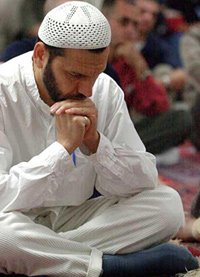Fasting during Ramadan triggers few concerns among health experts
Crankiness probably is the worst that most healthy Muslims will suffer during the monthlong fast of Ramadan.

In fact, studies that have examined health consequences of the religious practice as well as fasting in general have suggested people might even experience benefits normally associated with long-term calorie-cutting.
"Most will have absolutely no (negative) health effects from the fast," says Dr. Sondra Crosby, who specializes in refugee health at Boston Medical Center. "Most people tell me they feel invigorated and energized during Ramadan."
Even weight loss isn't a significant concern; Crosby reports few of her Muslim patients lose weight.
That's partly because the religious rules governing the fast allow for eating and drinking from sunset to sunrise, giving people the opportunity to make up for meals and liquids missed during the day.
It's also because the human body is particularly adept at adjusting to even extreme dietary fluctuations. During fasts, metabolism slows so fewer calories are needed and less fat is burned.
But Milton Stokes, a spokesman for the American Dietetic Association, says he doubts a monthlong fast is long enough to have any lasting effect on metabolic rates.
He does, however, worry about diabetics who fast. Regular meals are a key part of regulating blood sugar levels.
"We don't want that person skipping meals because that's like skipping medicine," he says.
But Crosby says that with careful monitoring by a physician, even diabetics can fast safely. The key is to consume plenty of food and water before dawn and after sunset, as well as to adjust the timing of any medications.
Headaches and crankiness are the most common complaint, but those are as likely explained by caffeine withdrawal as by hunger, Crosby says. She urges her patients to ease off caffeinated drinks prior to Ramadan, reports AP.
And studies in the Middle East have not found higher rates of serious health problems such as heart attacks or stroke during Ramadan, Crosby says.
Her advice: Drink plenty of water before the fast to stay hydrated throughout the day, and avoid strenuous exercise.
Subscribe to Pravda.Ru Telegram channel, Facebook, RSS!


